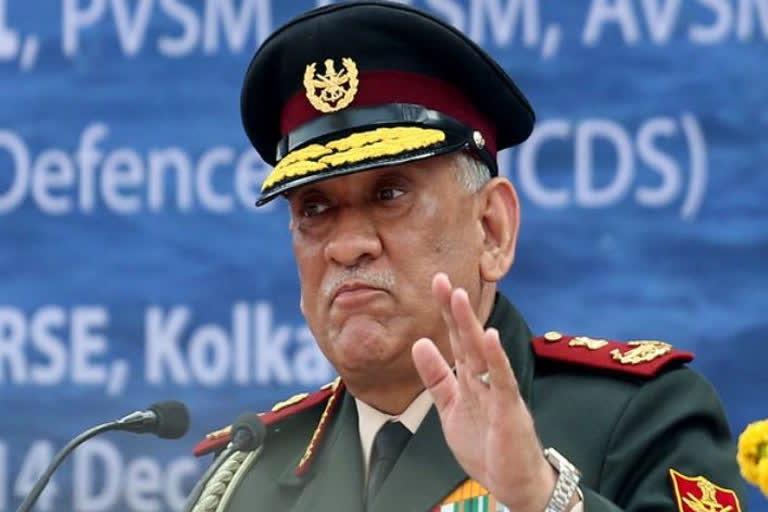New Delhi: India’s first-ever Chief of Defence Staff (CDS) General Bipin Rawat’s sudden death in a chopper crash has left Indian military theaterisation plan in a lurch as he was the prime mover of the biggest military reform plan.
Bringing back tragic memories of the 1963 deadly chopper crash in Poonch that killed three general-ranked officers, one air vice marshal, a brigadier and a flight lieutenant, a Mi 17-V5 helicopter crashed near Coonoor about 20 km away from the Ooty hill-station in Tamil Nadu’s Nilgiris district on Wednesday noon, killing CDS General Rawat.
The dead included Gen Rawat’s entourage including his wife Madhulika Rawat, a brigadier, a lieutenant colonel and five from other ranks besides the crew. The only survivor currently under treatment at the Wellington military is group captain Varun Singh.
Prime Minister Narendra Modi tweeted: “As India’s first CDS, Gen Rawat worked on diverse aspects relating to our armed forces including defence reforms. He brought with him a rich experience of serving in the Army. India will never forget his exceptional service.”
A distressed defence minister Rajnath Singh also tweeted: “Deeply anguished by the sudden demise of Chief of Defence Staff Gen Bipin Rawat, his wife and 11 other Armed Forces personnel in an extremely unfortunate helicopter accident today in Tamil Nadu… His untimely death is an irreparable loss to our Armed Forces and the country.”
Krishnaswamy, a witness to the crash, told a media outlet: “Heard a loud noise and that's when I saw the copter approaching. As it was descending, it caught on fire. It crashed into a big tree and was immediately engulfed in smoke. Then the entire chopper caught on fire...I saw a person who was up in flames. Then I saw three or four other persons who were fully charred.”
The CDS was flying in from the Sulur IAF base to the Defence Services Staff College, Wellington in the Mi 17-V5 chopper with tail number ZP 5164, first deployed with the IAF in 2011-12.
Read: CDS Bipin Rawat succumbs in Tamil Nadu helicopter crash: IAF
Gen Rawat and his entourage had flown in the morning in a fixed wing aircraft from New Delhi to the Sulur airbase, the second biggest IAF airbase in the country after Hindon, before taking the ill-fated chopper from Sulur to Wellington.
Wives of military officials of the rank of commander and above are authorized to accompany their husbands in their official tours.
It was on a cold and foggy December morning two years ago that India’s first Chief of Defence Staff (CDS) took charge with the prime mandate of effecting Indian military’s biggest reforms in history—that of bringing about theaterisation between the Army, Navy and Air Force.
It was a foggy morning again when the medium lift helicopter crashed into the hilly terrain just about 5 minutes before touchdown at Wellington where the General was to deliver a speech.
As CDS, Gen Rawat, with four stars and 43 years of military service and still counting, was designated the ‘first among equals’ among the army, navy and IAF chiefs and was gradually easing into his role of being the ‘one-stop window’ for military advice on financial and administrative matters for the three service arms of Indian military besides having a strong proactive opinion on cyber, space and the strategic warfare domains.
For all his wide mandate and broad sweep of responsibility, Gen Rawat’s role did not endear him to many of his former colleagues in the Army.
Quite of few of both serving and veteran officers may think Gen Rawat could have been more supportive on the one-rank-one-pension (OROP) and the disability criteria issues.
Read: IAF chopper crash: It is a personal tragedy for me says Major Gen GD Bakshi
There is also a feeling among many that the General may be outspoken in his views which to their mind often dimmed the lines between military professionalism and the pure political standpoints and positions.
But to be fair to him, the CDS assumed office at a time when the Indian military was at a cusp of dizzying changes including the move towards theaterisation.
At a time when the country’s economy was taking a bad hit, due to the Covid pandemic among other factors, and the ongoing challenges vis-à-vis a belligerent China, Gen Rawat has faced a tough time balancing the modernization and equipment acquisition costs from the scarce funds available.
There is no doubt that Gen Rawat saw some of the most turbulent times in the history of the army in particular and the Indian military establishment in general.
Besides the ongoing confrontation with China, and the 73-day-long Doklam standoff between Indian and Chinese troops in June 2017, it was during his time as Army chief that India made a few surgical and precision strikes across Myanmar and demolishing terrorist infrastructure and launch pads across the Line of Control in Kashmir.
It was also during his time that the government decided to go on the offensive against militants in Kashmir particularly after the unrest that kick-started with the killing of militant poster-boy Burhan Wani.
Gen Rawat’s rapid rise to the Army chief’s post wasn’t exactly a smooth and organic one. He superseded two of his service seniors (the then Eastern Army commander Lieutenant General Praveen Bakshi and then Southern Army commander Lieutenant General Pattiarimal Mohamadali Hariz) on December 31, 2016, to lead the 13-lakh-strong army.


